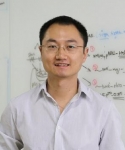


Ping WEI
Peking University
Academy for Advanced Interdisciplinary Studies
Principle Investigator
Education and Work Experience
2002 B.S., Nankai University
2007 Ph.D., Peking University
2007-2009 Postdoc, PKU-UCSF Intergrated Trainning Program
2009-2013 Postdoc, The Howard Hughes Medical Institute
2013-Present Principle Investigator, Peking University
Expertise and Research Interests
His lab is mainly focused on developping synthetic biology tools to engineer the important siganl transduction pathway in deciding the fate of cells. And then using the reprogramed singal transduction network to creat “smart” artificial cells.
Selected Publication
Wei P, Wong WW, Park JS, Corcoran EE, Peisajovich SG, Onuffer JJ, Weiss A, Lim WA. Bacterial virulence proteins as tools to rewire kinase pathways in yeast and immune cells. Nature. 2012, 488: 384-388.
Peisajovich SG, Garbarino JE, Wei P, Lim WA. Rapid diversification of cell signaling phenotypes by modular domain recombination. Science. 2010, 328: 368-372.
Liang H, Chen H, Fan F, Wei P, Guo X, Jin C, Zeng C, Tang C, Lai L. De novo design of a beta alpha beta motif. Angew Chem Int Ed Engl. 2009, 48:3301-3.
Chen H, Wei P, Huang C, Tan L, Liu Y, Lai L. Only one protomer is active in the dimer of SARS 3C-like proteinase. J. Biol. Chem. 2006, 281: 13894-13898.
Wei P, Fan K, Chen H, Ma L, Huang C, Tan L, Xi D, Li C, Liu Y, Ca A, Lai L. The N-terminal octapeptide acts as a dimerization inhibitor of SARS coronavirus 3C-like proteinase. Biochem. Biophys. Res. Commun. 2006, 339: 865-872.
Contact
Peking University, Academy for Advanced Interdisciplinary Studies
Email:This email address is being protected from spambots. You need JavaScript enabled to view it.